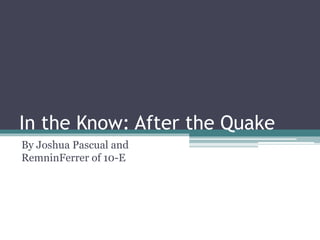In the Know: After The Quake
- 1. In the Know: After the Quake By Joshua Pascual and RemninFerrer of 10-E
- 5. YouŌĆÖve seen how to be prepared beforehand, Now youŌĆÖll know how to survive after one.
- 6. Focus This presentation was made mostly for the students Unit II, III and also for teachers and staff members of CSA. We believe that with the standard drills and practices taught to us regularly, they can understand a lot more on what weŌĆÖll be explaining. Those of Unit I are under the responsibility of the teachers themselves. Hence, this presentation may help with assisting the younger ones.
- 7. Objectives 1. To apply what weŌĆÖve learned in preparation for an earthquake and itŌĆÖs absolute importance after one. 2. To bring up more awareness of knowing what to do after an earthquake 3. To show some vital skills that may save you or a fellow studentŌĆÖs life.
- 8. WhatŌĆÖs the Damage? The intensity of the earthquake is what can show how much damage might be made. The processes we need to do depend on what happened and how many people are affected in an area. Class I: Significant, but harmless effect Class II: Significant and serious effect Class III: Dangerous and possibly life-threatening
- 9. I. After Evacuation It is through the drills that we know what to do during one. After reaching the schoolŌĆÖs safe zone, here are some things to remember: Class I-III: 1. Stay calm! 2. File in to check the class attendance 3. Immediately report if a classmate may be missing. 4. Standby for further orders and follow accordingly.
- 10. II. Health Check ItŌĆÖs always important to check for any signs of injury. If there are, following these may help: Class II-III: 1. Check from head to toe for signs of injury. 2. Do the same for classmates if they may. 3. If there might be a sign of injury, call a teacher for help and use the class medical kit for the specific injury.
- 11. III. The Class Medkit
- 12. Important Contents of the Kit: 1. Long Cloth ŌĆō for support and injury cover 2. Gauze Pads ŌĆō to cover any open wound 3. Disinfectants ŌĆō Ispropyl Alcohol, Hydrogen Peroxide, Betadine
- 14. IV: Cleaning After the Quake After a possibly strong earthquake, there would definitely be broken or misplaced objects that might be scattered along the classrooms and function rooms. If so, here are some things to remember: Class II: ŌĆó DonŌĆÖt go in without protection! Put on a mask or long sleeves if able. ŌĆó Check for a gas leak in any of the rooms ŌĆó DonŌĆÖt go in if the debris makes it impassable.
- 15. V. Situational Outcomes Besides the four given, we also need to be prepared for other situational outcomes. Some of these might even require more than we think.
- 16. A. Telecommunications In an event where the earthquake is serious, and the teachers allow the students to contact home; Class III: 1. Contact home immediately when given the chance to do so. 2. If a fellow classmate has no phone but needs to call, lend yours after you are finished. 3. If the service might be down, wait for it to come back
- 17. B. Suspension If the earthquake might cause significant damage, the administration might call for a suspension. If such happens: Class II-III: 1. Contact home once itŌĆÖs allowed by the teachers 2. Stay in the appointed waiting area 3. Inform the teacher once your appointed fetcher arrives.
- 18. C. Incapacitation Injury is preventable, but unavoidable in the event of an earthquake. If there is a time when a fellow classmate may be incapacitated or seriously injured, follow the following: 1. Calm down and give space for the victim. 2. Check for pulse and breathing if the victim fainted. 3. Apply first aid to the victim if needed. 4. Immediately call for help from a teacher or staff member.
- 19. Conclusion: ItŌĆÖs vital that weŌĆÖre all prepared for the disasters that come our way. Planning ahead truly makes us come back from these situations faster. As students of CSA, we must call to the help of others by anticipating that these may happen at any time. If there may be a time when an earthquake may cause severe damage, we must being formed and ready enough to help those in need.
- 20. Thank You So Much! Maraming Salamat sa Inyong Lahat!
- 21. References www. Wikihow.com/Make-a-Sling-for-your-Arm TLC: Make a Quake Simulation www. Seismic.ca.gov/after.html - The Class system used is solely made for this presentation and to give a concept to the necessary situations.





















